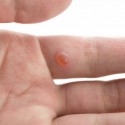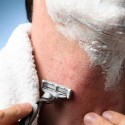11 Science-Backed Home Remedies for Eczema
What is Eczema?
If you have dry, itchy patches of skin, you may be one of over 30 million people in the US diagnosed with eczema.
If you have recurring problems with red, scaly areas that seem to appear, disappear, then come back, you could have one of the many different skin disorders that are categorized as eczema.
Knowing your risk factors, what makes these skin conditions worse, and how to treat them naturally, can save you from scratching and heal your skin faster.
Our guide to home remedies for eczema will give you all this, and more.
Eczema is really a category of skin disorder that includes many different problems.
Most people who have eczema show signs of it as an infant or toddler, and because this disease is chronic, you will likely have symptoms of it your entire life.
That is why understanding how to decrease the frequency of flare-ups and calm the itch are important for anyone who suffers from eczema.
Keep reading to understand more about the causes of eczema, as well as ten natural remedies that you can use to help treat your skin problems at home.
Understanding Eczema
The skin problems that fall into the category of eczema include stasis dermatitis, atopic dermatitis, contact dermatitis, neurodermatitis, hand eczema, nummular eczema, and dyshidrotic eczema.
Eczema is not contagious. Instead, you get eczema from a combination of environmental triggers and genetic factors.
Most people have their first eczema outbreak by the time they are five years old, and over half of the eczema sufferers see their first outbreak before turning one.
More children than ever before are being diagnosed with eczema (2).
While you still can develop eczema as an adult, this happens in only about 10 percent of cases.
While eczema resembles other disorders like psoriasis and rosacea, it is not the same disease and should be treated differently.
The development of eczema in young children is linked to a number of other disorders, and to socioeconomic factors.
Those who have eczema carry a genetic marker for the disease, and different environmental factors can trigger symptoms (3).
Eczema is actually more common in children from more advantaged homes, children with fewer or no siblings, and in children whose parents smoke (4).
Eczema includes a number of skin conditions that are chronic in nature, but some types of eczema, like contact dermatitis and hand eczema, are acute and are usually the result of exposure to environmental influences.
Some adults can experience eczema outbreaks for the first time after receiving specific vaccinations, or after being exposed to new allergens.
If you had eczema as a child, chances are your flare-ups are less severe now than when you were younger, but this disease can appear and disappear throughout your lifetime.
This is why understanding the triggers of eczema, and how to manage your symptoms, is so beneficial.
Eczema Risk Factors
Because eczema has no single cause, it is believed that several factors combine to produce this skin disorder.
While not everyone with eczema will have all of these causes, having several means you are more likely to experience this disorder.
The causes of eczema include:
- A family history of asthma, eczema, or hay fever;
- Children that go to daycare or attend preschool;
- Being nutritionally deficient in certain vitamins and minerals;
- Your age;
- Working in the healthcare field;
- Living in an arid place;
- Being obese as an adolescent;
- Having ADHD;
- Having a mother who was deficient in Vitamin D during pregnancy.
Eczema Causes
Because eczema has no single cause, it is believed that a variety of factors combine to produce this skin disorder.
While not everyone with eczema will have all of these causes, having several means you are more likely to have this disorder.
The causes of eczema include:
- Genetic variations;
- Dysfunction of the immune system;
- Environmental influences;
- Having sensitive or dry skin that cracks;
- Being under chronic stress;
- Shifts in air temperature;
- Having allergies to chemicals, foods, and substances that touch your skin.
Eczema Symptoms
Eczema is a disorder that manifests differently in individuals and over time.
Your symptoms as a young child may be completely different from your symptoms as an adult, and they can also change from one outbreak to the next.
The most common symptoms of eczema are:
- Bumps on the skin that are small and raised. They can ooze, becoming crusty.
- Scaly patches of skin that are brown, gray, or red in color. These can appear anywhere on the body but are common on the neck, wrists, ankles, feet, hands, and eyelids. This type of reaction is also common on the head and face of infants.
- A rash that recurs frequently and causes severe itching. This type of rash can keep you awake at night.
- Skin that is made sensitive, swollen, and/or raw from scratching.
Treating Eczema Naturally
There is no cure for eczema, unfortunately.
Those with the disorder must instead treat the symptoms.
You can also focus on reducing the factors that trigger eczema outbreaks.
Because eczema can strike anywhere on your skin, including your face, arms, neck, and other exposed areas, it can often be embarrassing and cause anxiety in those who suffer from the disease.
It is therefore important that you find a treatment or treatments that work well for you and your skin, and stay on top of your outbreaks when they flare.
The following non-invasive remedies include natural ingredients and lifestyle changes that can help reduce symptoms, ease discomfort, and help your skin look and feel better soon.
There are traditional medical treatments for eczema, including the use of topical or ingested steroids, but if you are looking for natural, chemical-free ways to treat your skin, here are our favorite home remedies.
Get Enough Vitamin D
Getting sufficient sun exposure is an excellent strategy for treating your eczema flares.
Just 15 minutes of sunshine a day can help calm itchy skin, lower inflammation, and promote the production of Vitamin D by your skin’s cells.
Exposure to the sun can also help fight any bacteria on your skin, and boost your immune system (5).
Eating foods rich in Vitamin D is also an excellent treatment, as this important nutrient is responsible for skin health and other important metabolic functions that can decrease eczema symptoms.
Foods like raw milk, eggs, and fatty fish like cod, sardines, and salmon are good natural sources of Vitamin D, and these can help prevent eczema from developing in children, as well.
You may also consider taking a Vitamin D supplement, especially if you live in a colder, cloudier climate where your sun exposure is limited.
Children especially need Vitamin D, so be sure they are getting sufficient amounts each day (6).
Keep Skin Moisturized
Dry skin is both a symptom and a cause of eczema, so keeping your skin moisturized is imperative if you have eczema.
Use a high-quality moisturizer at least twice a day, especially in areas prone to breakouts.
Because it has antimicrobial properties and also soothes skin well, coconut oil is an excellent, natural choice for those with eczema.
This can boost your skin’s healing power, and help get rid of any pathogens that may be on your skin, as well.
Use Cool Compresses
When you have a flare-up, try a cool, wet cloth to soothe itching.
This remedy works well with children to calm itching skin and avoid scratching, which can lead to infection.
If eczema patches are already infected or oozing, do not use this method, though, as it can spread infection easily.
Get More Omega-3 Fatty Acids
Children who start eating fatty fish early and do so often have a dramatically lower risk of developing eczema (7).
The omega-3 fatty acids found in fish like wild-caught salmon, sardines and mackerel help support immune system health and may prevent eczema in those who are young.
If you already have eczema, eating foods rich in omega-3s during a flare-up can calm symptoms by supporting your immune system’s work.
Don’t Neglect Your Mental Health
Skin conditions don’t just affect your body.
They also have a profound impact on your psychological health.
If your eczema is affecting your mental health, consider ways to address this for your well-being.
Some strategies include meditation, cognitive behavior therapy, hypnosis, and talk therapy.
Not only can these help you handle the impact of flares, but they can reduce your stress and inflammation which can be contributing to your breakouts, as well.
The mind has a powerful influence on the body, so dealing with stress, anxiety, and depression can not only improve how you feel mentally but can improve your skin, as well (8).
Take a Bath
Using baths to cool and soothe skin is a time-tested strategy.
Rather than just using water, though, consider the healing powers of potent additives to your bath water.
Here are three suggestions that have been shown to be useful for those with eczema.
In all cases, use water just warm enough to prevent a chill and not hot water.
Always pat skin dry, never rub.
- Use salt from the Dead Sea, which is known for its healing powers. These salts are known for promoting skin hydration, reducing inflammation, and relieving the roughness and redness associated with eczema outbreaks, due to their high mineral content (9).
- Make your own sea salt bath that is high in magnesium. Magnesium promotes skin healing and allows your skin to mend after an outbreak of eczema. Into a warm bath, add one-half cup of sea salt, one cup of Epsom salts, one cup of magnesium flakes, one-half teaspoon of vanilla extract, and up to 15 drops of your favorite relaxing essential oil. Use oils that are pleasant for skin, like lavender, frankincense, or rose.
- Make a chamomile bath, which relaxes your mind as it helps heal your skin. To make, first, boil one quart of water, then allow this to cool for a few minutes. Add five chamomile tea bags or five teaspoons of loose chamomile leaves. Allow the tea to steep for 15 minutes, removing the bags or leaves when it has cooled. Pour this into your bath, and mix thoroughly before climbing in.
Try Horsetail
The horsetail herb has anti-inflammatory properties that make it ideal for treating eczema.
It can ease itching and pain associated with eczema outbreaks, and it helps your skin produce collagen, which you need to regenerate new skin cells and create healthy tissue.
Create a horsetail compress to use on eczema patches by boiling water and adding dried horsetail.
Allow this to boil for at least 15 minutes, then remove from the heat and cool to room temperature.
Place a washcloth in the water, then wring out most of the water so that your compress is not dripping.
Allow the compress to rest on the affected area for ten minutes.
Use this process several times a day until the flare-up heals.
Get Your Vitamin E
Vitamin E is essential to skin health, and if you have eczema, taking up to 400 IUs of this vitamin every day can reduce the inflammation that may be causing outbreaks.
You can also use Vitamin E topically, applying it directly to eczema patches to speed healing, prevent scarring, and relieve itching.
Use Witch Hazel
Oozing of patches during an eczema flare should be treated quickly.
Use witch hazel on these patches to reduce inflammation, boost healing, and dry out the affected skin.
Witch hazel can help stop itching, and the antioxidants in this natural remedy will help your immune system heal your skin faster.
Try Tea Tree Oil
Tea tree oil is an effective skincare treatment because it has antiseptic as well as anti-inflammatory properties.
If you have been scratching your skin, using tea tree oil can prevent infection, or help treat an active infection.
It can also keep the infection from spreading.
Add 20 drops of tea tree oil to one-half cup of coconut oil, and mix thoroughly.
Rub this mixture into the affected area twice daily until the breakout clears.
If you have multiple flares on your body, adding tea tree oil to your bath is also effective.
Be sure to include a carrier oil, such as almond or coconut oil, as well as 15 drops of tea tree oil to your bath water.
Never apply undiluted tea tree oil directly to the skin.
Diet Changes to Treat Eczema
Getting the right nutrients in your diet is a great way to ensure not only your overall health but reduce outbreaks and flare-ups caused by eczema.
To get the essential fatty acids you need, especially omega-3s, eat plenty of flaxseed and flaxseed oil as well as fatty fishes such as wild-caught salmon.
Other seeds, like chia and pumpkin, provide you with needed zinc, which can help heal damaged skin.
Eating lots of vegetables that are yellow and orange will help you get the Vitamin A you need to promote healthy skin.
Make sure you eat lots of fiber, which will help your body naturally rid itself of the toxins and pollutants that can lead to outbreaks.
Fresh vegetables and fruits, as well as legumes, seeds, and nuts, are excellent natural sources of dietary fiber.
Help your immune system stay healthy and fight infection and other causes of eczema by eating lots of probiotics.
These are found in cultured and fermented foods like kefir, yogurt, sauerkraut, kimchi, and kombucha, among others.
If you are pregnant or breastfeeding, you can significantly reduce your baby’s chances of developing eczema by making sure you are getting lots of probiotics in your diet (10).
What NOT to Eat
When you have skin that is sensitive to foods, chemicals, or other environmental influences, it’s best to avoid common triggers or ones that may be specific to your skin disorder.
For most with eczema, avoiding foods with lots of additives and preservatives is helpful, as these can lead to sensitivities and further problems.
If you have any known food allergies, such as to peanuts, shellfish, dairy, or gluten, cut these completely from your diet.
Fried foods can raise inflammation levels throughout your body, making any breakouts harder to contain, as can high amounts of sugar.
Avoid unhealthy fats, which make it hard for your immune system to perform its functions.
Stick to a healthy diet rich in whole, natural foods, and avoid processed, packaged, or prepared foods whenever possible.
When to See a Doctor
If your skin disorder is affecting your sleep, causing you mental anguish or anxiety, or is extremely uncomfortable, talk with your doctor.
If your rash begins to ooze, becomes hot, or appears infected, you should seek medical attention.
When eczema outbreaks become severely itchy, scratching can open up the skin and allow pathogens to enter.
You should take care any skin infection promptly, especially with young children.
If you have eczema, you may also have an increased risk of stroke and other heart diseases.
If you also smoke, drink alcohol to excess, or live a sedentary lifestyle, your risk for heart disease is raised significantly.
Because sweating can aggravate skin problems, many with eczema are less active.
If you have eczema, you may also have an increased risk of stroke and other heart diseases.
If you also smoke, drink alcohol to excess, or live a sedentary lifestyle, your risk for heart disease is raised significantly.
Because sweating can aggravate skin problems, many with eczema are less active.
Controlling your eczema symptoms is essential for supporting your mental health and getting proper sleep; particularly for children, but also for adults.
Make sure you are treating your eczema symptoms when you notice them arise, which can keep problems from interfering in other parts of your life.
If you have a child with eczema, watch for signs of social withdrawal, anxiety, or depression.
Outbreaks on the face and other highly-visible parts of the body can provoke ridicule and even bullying, which can be difficult for any child to handle.
Provide support, and intervene when necessary to make sure your child isn’t suffering needlessly with their skin disorder.
Conclusion
Eczema is a common skin disorder that affects over 30 million people in the US alone.
There is no single cause for this group of skin disorders, and there is no known cure.
Many different types of skin problems are categorized as eczema, and these include chronic and acute conditions.
Most people with eczema have had it since childhood, with 90 percent of all cases having their first breakout before the age of five.
You can have patches of eczema anywhere on your body, but the sensitive skin on your cheeks, neck, hands, feet, ankles, and wrists are common areas for flare-ups to occur.
This can make coping with eczema hard because these are areas that are difficult to hide from others, which can lead to self-consciousness and anxiety about your appearance.
Because everyone with eczema experiences the disease differently, it is important to know and understand your symptoms and triggers.
Certain environmental and lifestyle influences can lead to outbreaks or flare-ups of eczema, so tracking your symptoms and possible triggers can be an important tool for preventing future outbreaks.
Common causes of eczema outbreaks include a poor diet with lots of preservatives, sugars, food allergens, and lack of essential nutrients.
Using natural home remedies can not only help relieve the itchy and red skin of eczema but lessen the frequency and severity of eczema outbreaks in the future.
Eating a nutritious diet, so that you get all the vitamins and minerals your body needs, is extremely helpful.
Natural remedies that gently treat your skin, moisturize dryness, and lower inflammation are all key in treating eczema symptoms.
Because eczema can also affect your mood and mental health, make sure you are also paying attention to these important aspects of your well-being.
Remember to see a doctor if your eczema symptoms are interfering with your life, causing you undue mental pain, or affecting your ability to sleep.
Get help if scratching leads to infection, or if your outbreaks do not respond to any treatment at home.
FDA Compliance
The information on this website has not been evaluated by the Food & Drug Administration or any other medical body. We do not aim to diagnose, treat, cure or prevent any illness or disease. Information is shared for educational purposes only. You must consult your doctor before acting on any content on this website, especially if you are pregnant, nursing, taking medication, or have a medical condition.
HOW WOULD YOU RATE THIS ARTICLE?





